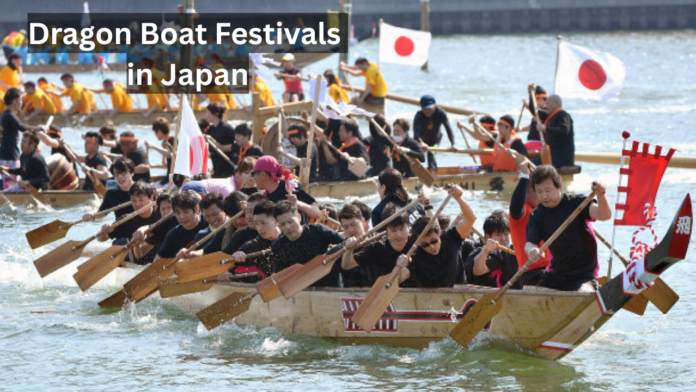Though designed in China, where the tradition was born more than 2,000 years ago, dragon boat festivals are also among Japan’s most colorful and culturally rich events. Dragon Boat Festivals in Japan are not just high-energy water races — they’re vibrant, community-oriented celebrations rooted in regional history, maritime traditions, and spiritual significance.
In this article, we take a look at the cultural significance, regional variations (yes, Japanese Dragon Boat Festivals differ!), and why they matter for readers either based in or visiting the U.S. who have an interest in Asian cultural festivals, traditional sports, and summertime festivities.
The Origins: How Dragon Boat Festivals Made Their Way to Japan
Dragon boat racing originated in an ancient Chinese festival, traditionally held to commemorate the death of the poet and statesman Qu Yuan. Over centuries, Chinese cultural influence spread across much of Asia, especially through trade and migration. Neighboring countries, including Japan, adopted and localized elements of the Dragon Boat Festival.
Dragon boat racing is believed to have been introduced to Japan during the Ryukyu Kingdom period (15th to 19th centuries), when Okinawa had strong ties with China and opportunities for cultural exchange. As it spread over time, different regions of Japan ritualized dragon boat racing in their own ways, blending foreign belief systems with local spirituality and traditions.
Dragon Boat Festivals in Okinawa: The Naha Hari
Japan’s most notable Dragon Boat Festival is the Naha Hari in Okinawa. “Hari” is the Okinawan word for dragon boat racing, and the tradition dates back centuries, initially rooted in prayers for safe sea voyages and bountiful fishing harvests.
Held every May during Japan’s Golden Week holiday, the Naha Hari is a spectacular event that draws both locals and tourists. The most iconic symbol of the festival is the colorful dragon boat — or hari-sen — ornately adorned and filled with teams of rowers representing local organizations, schools, or districts.
Each race is an intense experience, but the event is not just about competition. It’s also deeply spiritual: before the races begin, ceremonial prayers are offered to sea gods and ancestors for the safety of participants and the prosperity of the sea. Visitors enjoy fireworks, live music, traditional Okinawan performances, and street food, resulting in a festival atmosphere that is positively electric.
Regional Variations of Dragon Boat Festivals in Japan
While Okinawa is the heart of Japanese dragon boat racing, other regions in Japan also celebrate their own versions of the festival, each with distinct features:
- Itoman Hare (Okinawa)
One of the oldest fishing port cities in Okinawa, Itoman hosts the Itoman Hare (Itoman Holy Race) every year on May 4th. This version of the festival is closely tied to fishermen’s lives, and the rituals are taken very seriously. The races serve as symbolic offerings to the sea gods, meant to invite blessings for a bountiful catch and a safe return.
2. Shuri Hari (Okinawa)
This version, held in Shuri — the former capital of the Ryukyu Kingdom — is steeped in royal heritage. Historically held in honor of the Ryukyuan king, the modern version retains a sense of pageantry and reverence, connecting the event with the region’s regal past.
3. Nagoya Dragon Boat Festival
In central Japan, the Nagoya Dragon Boat Festival offers a more modern take. Unlike the coastal events in Okinawa, this inland celebration occurs on rivers and often incorporates modern sports formats. Popular among corporate teams and universities, the event encourages cultural exchange and team-building through sport.
Symbolism & Spiritual Meaning
What makes Japan’s Dragon Boat Festivals unique is their combination of spiritual reverence and communal unity. The sport itself demands stamina and synchronized paddling, but it’s the rituals, prayers, and offerings to sea and water deities that form the festival’s spiritual core.
Many Japanese communities view these rituals as essential for protecting fishermen, ensuring good weather, and warding off misfortune. Racing is seen as a symbolic act of traversing water to unite with the spiritual world. This emphasis on respecting nature ties into core beliefs in Shinto and Buddhism — philosophies that have shaped Japanese life for centuries.
Modern-Day Celebrations and Global Influence
Today, Japan’s Dragon Boat Festivals serve both as cultural attractions and community traditions. They attract international visitors, athletes, and media attention. In some cases, local governments use these festivals to promote tourism, economic revitalization, and cultural pride.
Festivals in cities like Naha and Nagoya have increasingly incorporated modern and international elements, such as:
- World Cup-style races featuring teams from the U.S., China, and Southeast Asia
- Cultural exhibits with taiko drumming, eisa dancing, and martial arts
- Interactive events for children and tourists, including boat rides and food fairs
For American travelers or residents interested in Japanese culture, attending a Dragon Boat Festival in Japan offers an immersive experience far beyond the typical sightseeing trail.
Cultural Exchange, Dragon Boats, and U.S.–Japan Friendship
- As Japanese culture has grown in popularity in the U.S. — from anime and cuisine to martial arts and festivals — the Dragon Boat Festivals of Japan have also gained recognition among American fans of East Asian traditions.
- Notably, some U.S. cities — including San Francisco, Honolulu, and Seattle — host their own dragon boat races infused with Japanese cultural elements. These events reflect how traditions can cross oceans and build new cultural bridges.
These festivals also serve as educational and cultural platforms for students, organizations, and Japanese-American communities to explore shared heritage and foster cross-cultural understanding.
Japan’s Dragon Boat Festivals represent a fascinating blend of ancient Chinese ancestry, Ryukyuan maritime traditions, and uniquely Japanese spirituality. From the ceremonial prayers in Okinawa to the competitive spirit in Nagoya, each festival offers a window into the cultural identity and history of its community.
For U.S. audiences — whether travelers, cultural enthusiasts, or anyone curious about Japan — these festivals offer meaningful insight into Japan’s living traditions. More than just sporting events, Japanese Dragon Boat Festivals are dynamic, spiritual, and cultural celebrations that continue to thrive in the modern world.

